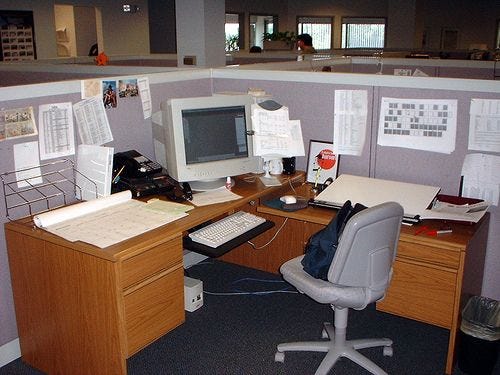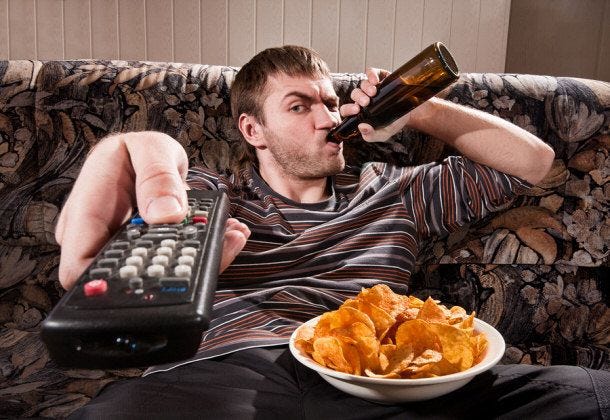Welcome to this week’s edition of Write & Lift. If this is your first time reading, subscribe here.
Two quick things:
If there is a recent essay that has sparked your curiosity, given you a new idea, or in any way contributed positively to your daily life, let me know below in the comments. Write & Lift is a constantly evolving publication and I want to know what piques your interest. If you’re a writer, you are inclined, like me, to get lost down whatever rabbit hole you stumble upon. While I aim to vary the topics each week, I want this to remain something you look forward to reading and to do so I thrive on suggestions and feedback. So if you have a rabbit hole you think I should explore, let me know.
Paid subscribers have access to our weekly “no-read” book club meetings on Saturday, 8 AM PST as well as other essays and book summaries. If you want to become a paid subscriber, upgrade your membership below. If you’re already a paid subscriber, check your email for access to this weeks book club meeting on Yukio Mishima’s “Sun and Steel”.
The Disney Adult
Many adults today have the psychological maturity of a teenage girl. Thirty-plus-year-old women screaming and crying when Taylor Swift walks on stage. Grown men queuing up for selfies next to Spiderman wearing Mickey Mouse ears at Disneyland. The frequent use of the word “adulting” to describe the daily chores and habits required to engage in normal life. Company-mandated snack bars, buffet spreads, and “safe spaces” designed to attract the new post-graduate generation.
Our ancestors walked in the cold to outdoor toilets, grew their food, worked grueling manual labor jobs, and had multiple children die in infancy. If only they could see you now; complaining about waiting in line in an air-conditioned bank to pay your bills after standing around at your retail job for six hours. Pathetic.
The “Disney Adult” phenomenon is a symbol of an infantile culture. Our modern comfort has made us weak. Without the need to be strong, one cannot become strong. The past necessitated strength, courage, and maturity. Life was difficult. As technology continued its exponential march of progress, the solutions to the omnipresent problems of daily life gave birth to many new ones. We thought that by making life easier, we’d have time and energy to pursue the adventures and tasks that made life meaningful. We didn’t foresee silicone “pocket pussies”, online role-playing games, mind-numbing pharmaceutical drugs, social media, and an endless stream of media waiting for our consumption. We’ve become a victim of our own success.
The Comfortable Prison
Upon graduating high school or college, young adults have completed what are often the hardest years of modern life. The battering ram of high school relationships and social dynamics is over. You’ve made it through the tests, long nights of studying, and distance from Mom and Dad. Here’s your diploma. Time for the rest of your life young one!
The right of passage into adulthood — as it has been understood for thousands of years — precedes a season of life where one takes a leadership role in their family, community, or trade. Today, our rights of passage have not only become easier (look at this data showing the declining standards in higher ed) but the concept of “Adulthood” has become fractured, disconnected, and lost. Many young adults are scared to have children because of the “economy” or “environment”. They endlessly dream about a passionate and fulfilled life, but they have no model or incentive to understand what that looks like.
Instead of cultivating self-respect, responsibility, family, and challenge, many young adults are finding a degraded facsimile of the comfortable space they spent the last decade of their lives. Classrooms are replaced by a job. Homework is replaced by menial “productive” tasks. And the teacher is replaced by a boss. The subconscious desire for adventure, the unknown; and legacy, doesn’t become lost, it simply gets channeled toward comfortable simulation. They simply resort to the last place of true wonder and excitement; a time when the world was new and magical. Childhood.
Childhood is a place of unknown wonder. The world is new. The days are long. We’re developing a sense of self — an identity. It’s a continuing and revolving door of wonder and excitement and primordial hallucinogenic joy. By the time we leave the mystery of childhood behind, we step into the next unknown. We take risks, date and have sex, and learn to work and to play; but the world is still young and the real responsibilities of tomorrow are shrouded. By the time many young people “wake up” at twenty-five, there is a gnawing realization that there is no guide for the rest of life. The responsibility for meaning and fulfillment rests with you alone.
If we follow the same path as our ancestors; get married, pursue a passion or skill, learn self-respect, live by a moral code, and challenge ourselves physically and mentally, adulthood is no longer a mystery but just the continuation of one’s self-development. The wisdom of adulthood can be imparted to your children, and so the cycle of life sustains itself. We don’t need to revert to fantasy and cheap dopamine. Our lives are sufficient.
The Consequences of “Failing to Launch”
Rather than embark on this necessary hero’s journey, Disney Adults live vicariously through characters on a screen. They simulate adulthood. They binge series after series that hints to their subconscious; “this could be you.” They take comfort in a time and place that the world felt new. They giggle with delight when the next season of “adventures in space!” is released. They become champions of someone else’s lore, instead of writing their own. Life becomes a series of convenient escapes from the boredom of the modern world, rather than an attempt to find one’s character and meaning on the other side of adversity.
I’m not purposefully being a misanthrope. One of the defining conditions of 21st-century life is that the lines between casual enjoyment and entertainment have become erased by a type of Peter Pan syndrome level of religious intoxication.
It’s not normal to have fifty thousand 22-40 year old women bursting into tears when Taylor Swift walks on stage. It’s not normal for hundreds of thousands of middle aged males on Reddit to debate the minute details of whatever video game “fandom” they immerse countless hours of their lives in. We used to describe these types of adults as “failures-to-launch” or “man-children”. Now the culture gives them cute names: “DINKS” (dual-income-no-kids), fanboys, dog moms, girl bosses, etc.
It doesn’t just manifest in thirty-year-old DINK couples on TikTok pronouncing in a snarky tone that they can bring their bull terrier to the brewpub and get blasted whenever they want because they have no kids. For every girl boss caricature who is “thriving” as a corporate dog mom, a substantial amount of young people are struggling to come to terms with the psychological journey they’ve neglected to take. Let’s look, for example, at the increase in NEETS (Not In Education - Employment - or Training). Data from 2023 show an unprecedented 12% of young men aged 16-29 can be classified as NEETs. To put this in perspective, about one out of ten young men you might see walking down the street are willingly choosing to not pursue anything in life — over four million young men in the United States. Simulated life; distracted life, is superior to the real world.
What Disney Adults fail to understand, is that there is a major difference between casual escapism and obsession. Stories, shows; hell, even videogames, are not unhealthy in and of themselves. In small doses, they can teach us about life, connect us with our friends, and take our minds off a stressful day. But they are only ever a watering down of the real; a condensed and digestible version of the thing outside your door. Jerking off out of sheer boredom will never compare to being intimate with your spouse. But that requires “putting yourself out there” for the reward of real physical connection. For many, it’s just easier to fall in love with a fantasy version of reality than it is to lift up Pandora’s Box and take the chance at enduring physical or mental discomfort.
To be worthy of ourselves; to live a life of meaning and personal fulfillment, requires us to embrace the uncomfortable path to psychological maturity. And when we don’t we feel empty, burned out, and depressed.
It makes complete sense why we’re in a crisis of mental health. A 2023 survey from the US Department of Health and Human Services found that 49% of 18-25-year-olds suffered from “symptoms” of depression. This is terrifying.
Until we start actively encouraging young people to take off the Mickey Mouse ears and put down the controller, expect this number to increase.
As always, thanks for reading.
-Joe











I'm just curious as to whether you think that not having children is "failure to launch"?
We are conditioned in denial. Life is suffering, but we have the means to pretend it's not or doesn't have to be. I think there's a significant backlash to the trend you're describing as well. The Jordan Peterson phenomenon is a sign of that, contra Taylor Swift. He hammers relentlessly at the existential and painful truths about life and the consequences of not living in those truths, and thousands of the generation you are discussing, affected most by social trends, are finding his message of responsibility bracing and compelling. He offers an 'antidote to chaos', and chaos is certainly what the culture is overwhelmed by right now on many fronts.